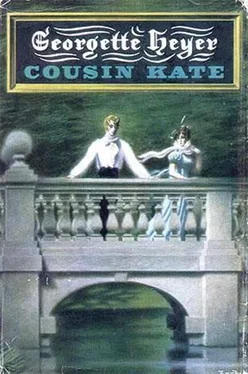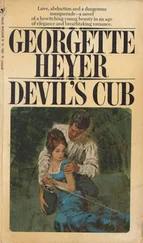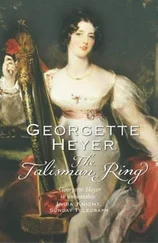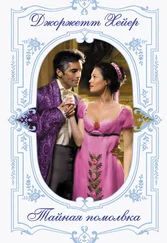Georgette Heyer
Cousin Kate
At no time during the twenty-four hours was the Bull and Mouth Inn a place of quiet or repose, and by ten o’clock in the morning, when the stage-coach from Wisbech, turning top-heavily out of Aldersgate, lumbered into its yard, it seemed, to one weary and downcast passenger at least, to be crowded, with vehicles of every description, from a yellow-bodied post-chaise to a wagon, with its shafts cocked up and the various packages and bundles it carried strewn over the yard. All was bustle and confusion; and for a few minutes Miss Malvern, climbing down from the coach, was bewildered by it, and stood looking round her rather helplessly. Until the guard dumped at her feet the small corded trunk which contained her worldly possessions and advised her to look sharp to it, no one paid the least attention to her, except an ostler leading out two horses, and adjuring her to get out of the way, and one of the inevitable street-vendors who haunted busy inn-yards, begging her to buy some gingerbread. The guard, assailed by demands from several anxious travellers to have their bags and bandboxes restored to them immediately, had little time to spare, but Miss Malvern’s flower-like countenance, and her air of youthful innocence, impelled him to ask her if anyone was meeting her. When she shook her head, he clicked his tongue disapprovingly, and expressed a hope that she might at least know where she was a-going to.
A gleam of amusement lightened the shadows in Miss Malvern’s large grey eyes; she replied, with a tiny chuckle: “Oh, yes! I do know that!”
“What you want, missy, is a hack!” said the guard.
“No, I don’t: I want a porter!” said Miss Malvern, speaking with unexpected decision.
The guard seemed to be inclined to argue this point, but as a stout lady was tugging at his coat-tails, shrilly demanding to know what he had done with a basket of fish consigned to his care, he was obliged to abandon Miss Malvern to her fate, merely shouting in stentorian accents for a porter to carry the young lady’s trunk.
This summons was responded to by a burly individual in a frieze coat, who undertook, for the sum of sixpence, to carry Miss Malvern’s trunk to the warehouse of Josiah Nidd & Son, Carriers. Since this establishment was situated a bare quarter of a mile from the Bull and Mouth, Miss Malvern had a shrewd suspicion that she was being grossly overcharged; but although an adventurous youth spent in following the drum had accustomed her to haggling with Portuguese farmers and Spanish muleteers, she did not feel inclined to embark on argument in a crowded London inn-yard, so she agreed the price, and desired the porter to lead her to the warehouse.
The premises acquired some years earlier by Mr Nidd and his son had originally been an inn, of neither the size nor the quality of the Bull and Mouth, but, like it, provided with a galleried yard, and a number of stables and coach-houses. Occupying a large part of the yard was an enormous wagon mounted on nine-inch cylindrical wheels, and covered by a spreading tilt. Three brawny lads were engaged in loading this vehicle with a collection of goods ranging from pack-cases to farm implements, their activities being directed, and shrilly criticized, by an aged gentleman, who was seated on the balcony on one side of the yard. Beneath this balcony a glass door had once invited entrance to the coffee-room, but this had been replaced by a green-painted wooden door, flanked by tubs filled with geraniums, and furnished with a bright brass knocker, indicating that the erstwhile hostelry had become a private residence. Picking her way between the piles of packages, and directing the porter to follow her, Miss Malvern went to it, lifting its latch without ceremony, and stepping into a narrow passage, from which a door gave access into the old coffee-room, and a flight of uneven stairs rose to the upper floors. The trunk set down, and the porter dismissed, Miss Malvern heaved a sigh of relief, as of one who had accomplished an enterprise fraught with peril, and called: “Sarah?”
No immediate response being forthcoming, she called again, more loudly, and moved to the foot of the stairs. But even as she set her foot on the bottom step, a door at the end of the passage burst open, and a lady in a flowered print dress, with an old-fashioned tucker round her ample bosom, and a starched muslin cap tied in a bow beneath her chin, stood as though stunned on the threshold, and gasped: “Miss Kate! It’s never you! Oh, my dearie, my precious lambkin!”
She started forward, holding out her plump arms, and Miss Malvern, laughing and crying, tumbled into them, hugging her, and uttering disjointedly: “Oh, Sarah, oh, Sarah! To be with you again! I’ve been thinking of nothing else, all the way! Oh, Sarah, I’m so tired, and dispirited, and there was nowhere else for me to go, but indeed I don’t mean to impose on you, or on poor Mr Nidd! Only until I can find another situation!”
Several teardrops stood on Mrs Nidd’s cheeks, but she said in a scolding voice: “Now, that’s no way to talk, Miss Kate, and well you know it! And where else should you go, I should like to know? Now, you come into the kitchen, like a good girl, while I pop the kettle on, and cut some bread-and-butter!”
Miss Malvern dried her eyes, and sighed: “Oh, dear, would you have believed I could be so ticklish? It was such a horrid journey—six of us inside!—and no time to swallow more than a sip of coffee when we stopped for breakfast.”
Mrs Nidd, leading her into the kitchen, and thrusting her into a chair, demanded: “Are you telling me you came on the common stage, Miss Kate?”
“Yes, of course I did. Well, you couldn’t expect them to have sent me by post, could you? And if you’re thinking of the Mail, I am excessively glad they didn’t send me by that either, because it reached London just after four o’clock in the morning! What should I have done?”
“You’d have come round here straight! For goodness’ sake, dearie, what’s happened to bring you back in such a bang, with never a word to me, so as I could have met you?”
“There was no time,” explained Kate. “Besides, I couldn’t have got a frank, and why should you be obliged to pay for a letter when you were going to see me immediately? I’ve been turned off, Sarah.”
“ Turned off ?” repeated Mrs Nidd terribly.
“Yes, but not without a character, said Kate, with an irrepressible twinkle. “At least, Mrs Grittleton wouldn’t have given me one, but Mr Astley assured me his wife would, and was very sorry to lose me. Which, indeed, I expect she is, because we dealt very well together, and I did make the children mind me.”
“And who, pray, may this Mrs Grittleton be?” said Mrs Nidd, pausing in the act of measuring tea-leaves into a large pot.
“A griffin,” replied Kate.
“I’d griffin her! But who is she, love? And what had she to say to anything?”
“She is Mrs Astley’s mother. She had everything to say, I promise you! She took me in dislike the moment she saw me. She said I was too young to have charge of her grandchildren, and she told poor Mrs Astley that I had insinuating manners. Oh, yes, and that I was sly, and designing! That was because her detestable son tried to kiss me, and I slapped his face. Though why she should have thought that was being designing I can’t conceive! Oh, Sarah, you never saw such a moon-calf! He is as silly as his sister, and not by half as agreeable! She may be a wet-goose—which, indeed, she is!—but the most amiable creature! And as for my being too young to have the charge of the children,
Читать дальше








